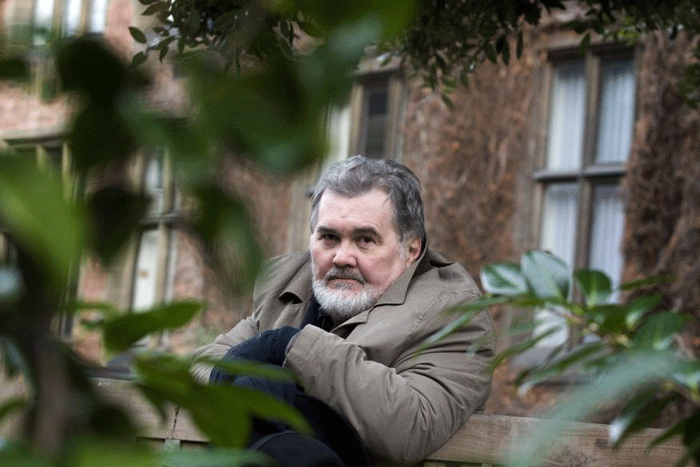Right as rain: Why poet Sean O'Brien thinks a waterlogged garden in a thing of beauty
Can he persuade the rest of us to share his soggy vision?

Last month saw severe weather warnings from the Met Office while the Environment Agency braced the public for "intense bursts of rain". You'd think that gardeners, at least, could see this as a blessing, but there's been all kinds of horticultural problems as a result of waterlogging. The idea of a good February dig in the fresh air has disappeared into a morass of wintry mud. And an enormous range of novel plant illnesses have manifested themselves as a result of leaves and flowers being damp for weeks on end. Every geranium has mildew; every pear tree, sooty mould.
Of course, if you venture out, you'll get soaked. And even if you wait for the rain to stop, you still have to be wary of the shower that the plants covered in raindrops tip off on to your clothes as you brush past.
Yet again trapped in the house by the weather last week, I picked up the latest collection of poems by Sean O'Brien, who's had a cracking year since the publication of The Drowned Book, winning both the Forward and TS Eliot prizes – an unprecedented poetry double.
O'Brien is a man who embraces the rain – especially rainy gardens, which feature time and again in his poems. "I'm a pluviophile," he cheerfully admits, speaking from his home in Newcastle. "I grew up in Hull, which was built on a flood plain. Well, really it was a monastic settlement on a swamp. If you dug a hole in your back garden, it would slowly fill with water. And when I was little, parts of the city would flood. It was exciting. I am haunted by the idea of the pubs in the old part of the city having their cellars flooded, and I'm intrigued by the idea that the floodwater might somehow insinuate itself into the beer."
With so many childhood memories touched by water, O'Brien began to compile a collection, little knowing it would end up being published in a year that saw such an abundance of rain. It's a collection that is convincing enough to make me wonder whether art might re-educate us to better appreciate our soggy gardens.
Poetry has succeeding in reshaping gardening taste before. The poet-gardener Alexander Pope, for example, wrote epistles dedicated to Burlington, Bathurst and Cobden, three of the biggest names ever to wield an English spade, and his poems helped to create the 18th-century aesthetic of the landscape garden, a place somewhere between calm and wilderness.
O'Brien has every chance to pull off a similar trick. His poem "Arcadia", for example, describes a journey in a rowing boat across a lake in a fantastical garden with a touch of mythical strangeness. "It's a mixture of a real park in Hull, called Pearson Park, with some changes made for my own purposes." Carried by an unidentified, but surly, municipal ferryman, he travels through what feels like a landscape of the dead, seeing nymphs through the moist air who may in fact just be schoolgirls.
"Praise of a Rainy Country", meanwhile, written in memory of the Northern writer Julia Darling, whose premature death touched O'Brien personally, takes place in a drenched world with something of the 1970s about it. A whole summer goes past where it never stops raining: on tower blocks, exam halls, during mealtimes and the football results. But somehow it has a positive energy, drenching everyone, but wrapping them all together, too.
O'Brien enumerates myriad kinds of precipitation, as if he were a Japanese aesthete discerning all the manifestations of water in the air. Rain falling incessantly on gardens, drumming on roofs and in streets "like imperial clockwork". "There is something about the rain," he says, "that is both heart-breaking and consoling."
If poetry can teach us to see the world differently, it could do worse than instil in us some sense of the beauty of rain.
'The Drowned Book' by Sean O'Brien (Picador, £8.99) is out now
Join our commenting forum
Join thought-provoking conversations, follow other Independent readers and see their replies
Comments
Bookmark popover
Removed from bookmarks